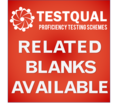TestQual News
Glyphosate Renewal Group (GRG): EFSA, MRL and analysis
Glyphosate is renewed 10 additional years:Glyphosate (europa.eu)
Glyphosate, a widely used herbicide worldwide, has undergone a comprehensive risk assessment in the EFSA peer review assesment for the Glyphosate Renewal Group (GRG) to determine its safety for humans, mammals, and the environment. The assessment considered key analytical aspects, glyphosate and the rest of components of the residue definition for food and feed of plant origin. According to the EFSA opinion, glyphosate's metabolite AMPA and other potential analytes like N-acetyl-glyphosate were also assessed. Various matrices, such as soil, water, and food, were considered, and precise residue definitions were established to accurately quantify glyphosate levels in the samples.
The hazards to mammals and humans related to glyphosate were examined in the risk assessment. Although acute and long-term risks to birds and mammals from dietary exposure were considered low, small herbivorous mammals may face an increased risk. Additionally, detected glyphosate residues in contaminated water sources can affect mammals and birds through ingestion. While endocrine disruption was not clearly evident, chronic exposure to glyphosate can still have adverse effects on mammals and humans, requiring careful consideration and risk mitigation measures.
Detected glyphosate residues in food raise concerns about potential consumer exposure. This scientific evaluation serves as a basis for informed regulatory decisions and provides public information to make informed choices regarding residue definitions, Maximum Residue Limits (MRLs), and consumer health and well-being protection.
The GRG are usually are analyzed by LC-MS/MS, more information and approaches can be found about the analytical method in the QuPPe.
Glyphosate is currently approved in the EU until 15 December 2023. However, it is essential to adhere to the established MRLs to ensure consumer safety and comply with Regulation (EC) No 396/2005. MRLs are the upper levels of pesticide residues legally permissible in or on food or animal feed, based on good agricultural practice (GAP) and the lowest exposure necessary to protect vulnerable consumers. These limits also apply to imported food, set as “import tolerances” to meet international trade requirements, the glyphosate levels (and other pesticides) can be consulted in Regulation No 293/2013.
Analyzing glyphosate accurately is crucial for consumer health due to its widespread use in food production. To guarantee precision and reliability of results, laboratories must conduct internal quality controls (e.g., blind sample replicates, analysis of materials for quality control) and external controls (e.g., inter-laboratory comparisons, proficiency tests). These proficiency tests ensure laboratories maintain high standards of quality and accuracy in glyphosate, AMPA, the rest of the GRG and other relevant pesticides for residue definition compliancy of food consumed and preserve consumer health protection.
TestQual, as an ISO 17043 accredited international proficiency test provider,offers accredited glyphosate testing services for fruit and vegetable products, as well as other polar pesticides.
If you are looking for a quality control, to keep or increase the trust of your client in the analysis your laboratory performs, check out our catalogue and/or contact us, we will help you find or organize the quality control you need.
References/bibliography:
https://efsa.onlinelibrary.wiley.com/doi/epdf/10.2903/j.efsa.2023.8164
eur-lex.europa.eu/legal-content/EN/TXT/PDF/?uri=CELEX:32013R0293
www.eurl-pesticides.eu/userfiles/file/EurlSRM/EurlSrm_meth_QuPPe_PO_V12_1.pdf
https://www.efsa.europa.eu/en/topics/topic/pesticides
Consulted and written: 01/08/23





